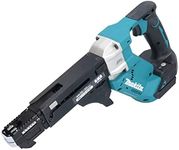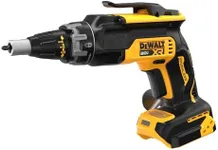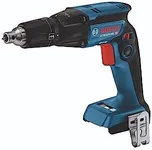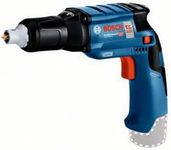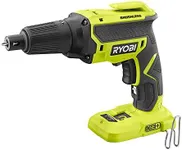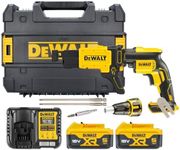Buying Guide for the Best Drywall Screw Guns
When choosing a drywall screw gun, it's important to consider the specific needs of your projects and how often you'll be using the tool. Drywall screw guns are designed to make the process of installing drywall faster and more efficient by driving screws quickly and consistently. Understanding the key specifications will help you select a tool that matches your requirements, whether you're a professional contractor or a DIY enthusiast.Power SourceThe power source of a drywall screw gun can be either corded or cordless. Corded models are typically more powerful and are ideal for heavy-duty, continuous use, as they provide a constant power supply. They are best suited for professional contractors who work on large projects. Cordless models offer greater mobility and convenience, as they are not tethered to an outlet. They are powered by rechargeable batteries and are suitable for smaller projects or when working in areas without easy access to power. Consider how often and where you'll be using the tool to determine which power source is best for you.
Speed (RPM)The speed of a drywall screw gun is measured in revolutions per minute (RPM). Higher RPMs allow for faster screw driving, which can be beneficial for large projects where time efficiency is crucial. Most drywall screw guns have variable speed settings, allowing you to adjust the speed based on the material and type of screws being used. For general drywall installation, a speed range of 2500 to 4000 RPM is typically sufficient. If you frequently work with different materials or require precision, look for a model with adjustable speed settings.
TorqueTorque refers to the force the screw gun applies to drive screws into the drywall. Higher torque is necessary for driving screws into denser materials or when using longer screws. If you primarily work with standard drywall, a moderate torque level will suffice. However, if you often deal with thicker materials or need to ensure screws are driven flush without damaging the surface, consider a model with adjustable torque settings. This feature allows you to customize the force applied, ensuring optimal performance for various tasks.
Weight and ErgonomicsThe weight and ergonomics of a drywall screw gun can significantly impact user comfort, especially during extended use. Lighter models are easier to handle and reduce fatigue, making them ideal for overhead work or long projects. Ergonomic designs with comfortable grips and balanced weight distribution enhance control and reduce strain on the wrist and arm. When selecting a screw gun, consider how it feels in your hand and whether you can comfortably operate it for the duration of your typical projects.
Depth AdjustmentDepth adjustment is a feature that allows you to control how deep the screw is driven into the drywall. This is important for achieving a professional finish, as screws that are too deep can damage the drywall, while those that are too shallow may not hold securely. Look for a screw gun with easy-to-use depth adjustment settings, which will enable you to quickly adapt to different materials and ensure consistent results. This feature is particularly useful for those who frequently switch between different types of drywall or require precise control over screw placement.
